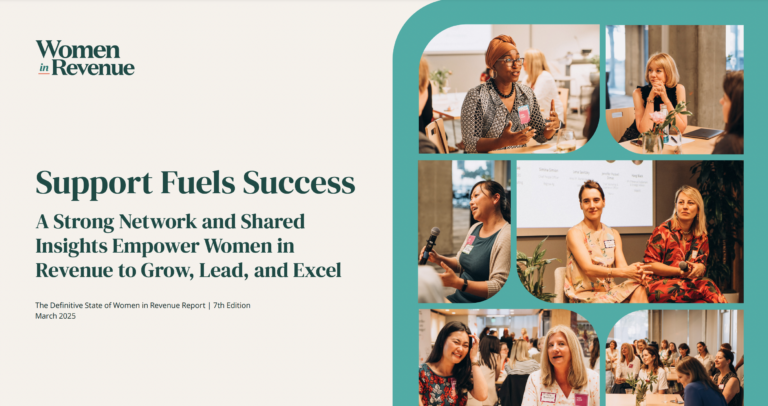The traditional 9-to-5 in-person office setup no longer suits all employees. In fact, the in-person 9-5 is as relevant as a 1980s VHS tape.
Women in revenue roles—those in sales, marketing, revenue operations, and customer success—are leading the charge for change. Women in Revenue (WIR) released their Definitive State of Women in Revenue Report in April 2024, showing that flexibility is not just a want; it’s a necessity. Women’s need for flexibility creates an urgent need for adaptable opportunities, affecting organizations and global performance.
The Urgent Need for Flexibility
Organizations have an urgent need to keep women in their roles and advance them to leadership positions. Research shows that groups with women have higher collective intelligence. The Pew Research Center found that women rank better than or equal to men in seven of eight leadership traits. These benefits pay off – a Harvard Kennedy School study found that teams with fewer women have lower sales and profits compared to teams with a balanced gender mix.
Yet, the The Definitive State of Women in Revenue Report shows that women in revenue roles are vocal about needing more flexible work environments.
This shift towards remote work isn’t just about convenience or to isolate; it’s about creating a work-life balance that fosters both personal and professional growth. The data suggests that women carry a heavier load of responsibilities at home, including housework and caregiving for children or parents. Studies show that women carry a heavier mental load, meaning they manage household routines, organize schedules, maintain order, and provide emotional support to children.
This explains why 45% of women in Women in Revenue’s report considered quitting their job last year due to inflexible work conditions. 77% of the respondents prioritize work-from-home options when considering job offers.
Look – we’ll come right out with it. Women are not only bringing home the bacon, they’re frying it too. Women need flexibility to balance work and home. This flexibility leads to better outcomes for organizations and businesses. When businesses prioritize what they want (collaboration) over what high-performing female employees need (flexibility), they risk losing those employees.
The Retention Risk
For employers, pushing to return to the office is a worthy effort. Employers believe in-person collaboration is better, helps reinforce business culture, and boosts productivity when employees are in-office. Employers can better sense which employees may be burning out and can step in to prevent overworking. They also feel more in control of employees’ development and future opportunities when they see them in person. Being in office is not just easier; it’s better.
Yet, female employees still want more flexibility, not less. This clash highlights deeper issues around gender roles, workplace equity, and the need for modern, inclusive policies that address evolving workforce needs while maintaining cohesion and efficiency.
The biggest risk for organizations enforcing a strict in-office mandate is missing out on key female talent. The Definitive State of Women in Revenue Report shows that over three quarters of the survey respondents (77%) prioritize work-from-home options when considering job offers.
Further, in-office-only mandates can cause regrettable turnover. 45% of respondents considered quitting in the past year, and only 22% felt secure enough to stay without thoughts of leaving. The lack of flexible options drives them away, with 34% of leaders and 51% of individual contributors looking for new opportunities.
Flexible work arrangements are key to retaining top talent
Employers who offer flexible work options will get ahead and those who don’t will fall behind. This applies to day-to-day work and development opportunities. Not all women have the ability to up and move their families for a “rounding out” opportunity in another city, state, or country. By offering flexible options, companies can ensure their best employees feel valued, can grow, and are secure.
It’s easy to find ways to retain employees by offering flexible working arrangements. If you’re looking for more examples, start your journey down the rabbit hole with Top Workplaces awards or these top flexible employers highlighted by Sustainability Magazine.
The Balance Dilemma: Balancing Work and Life
The driver behind this movement is the need for women in revenue roles to mold work-life dynamics to fit her unique needs and lifestyle. A woman’s requirements will continue to evolve as she gains a variety of life experiences and societal gender norms catch up to her drive and determination. Let’s be clear: there is not just one approach for every woman and it will not be fixed over time.
So what’s an employer to do?
The best employers start by considering the vast array of ideal employment experiences for women in their culture. Then they build systems and policies that promote flexible work options like hybrid work, results-focused work, a four-day work week, or virtual stretch assignments.The Definitive State of Women in Revenue Report highlights that work-from-home options (77%) and flexible hours (54%) are the most critical benefits for job-seeking women so be sure to include them.
In one case, one of our members has a female direct report with a very young child and a partner who has as robust a career as she does. The manager and the employee agreed to no-meeting Tuesdays, working offsite and with flexible hours. They monitor outcomes closely to ensure all deliverables and timelines are being met. The direct report then gets to decide how, when, and from where she works. And it satisfies the flexibility she needs at this point in her life.
A worthy concern that many employers have is that those who work remotely will work endlessly and burn themselves out. Some employers establish clear boundaries and support systems to help employees maintain a healthy balance, leading to higher job satisfaction and productivity. But the best and most healthy way to create those boundaries is to have a supervisor – male or female – model the desirable behavior too. Leaders must maintain reasonable work hours, avoid burnout, avoid working on weekends (or at least schedule their email sends for Monday mornings), and improve their health, including spending time with loved ones outside of work. They can then improve visibility by discussing their balance when they return to work.
Voices of Experience
Women in revenue share powerful stories of struggles and triumphs in their professional journeys. From dealing with toxic leadership and lack of consideration for family responsibilities to being laid off during maternity leave, these experiences show the real need for empathetic and flexible work environments. Here are just a few quotes that made our hearts beat a bit faster…
- I experienced toxic leadership with little consideration as to work/life balance.
- I was harassed during [time off for my father’s death] and laid off upon my return.
- Despite being tapped on the shoulder, I didn’t apply for our leadership program because it required a month overseas.
These stories are not just anecdotes; they show the need for employers to create a more inclusive and supportive workplace.
Retain Talented Women by Building Flexible Working Options
Over 400 women, half of whom are members of Women in Revenue, responded to the survey: employers who prioritize flexibility to support and retain women in revenue roles will win this talented group of professionals who increase workplace intelligence, elevate business outcomes, and improve business profitability. This includes offering remote and hybrid work options, flexible hours, transparent compensation, and robust professional development opportunities.
With these actions (and others), employers can create a work environment where women in revenue can thrive, leading to better retention, higher productivity, and a more inclusive workplace.
Flexibility is a Necessity, Not a Nicety
Flexibility is not just a benefit; it’s a necessity for women in revenue. And since it’s a necessity for female employees, it is an urgent imperative for all organizations.The State of Women in Revenue report’s insights emphasize the critical need for employers to embrace flexible work arrangements. By doing so, companies can retain top talent, support work-life balance, and create a more inclusive and productive workplace.
To dive deeper into the findings and insights, download the full State of Women in Revenue report. Empower your organization to lead with flexibility and support the women who drive your success.




